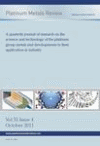-
oa Platinum-Copper on Carbon Catalyst Synthesised by Reduction with Hydride Anion
INITIAL FINDINGS ON REACTIVITY AND DISPERSION CHARACTERISTICS
- Source: Platinum Metals Review, Volume 51, Issue 3, Jul 2007, p. 138 - 144
-
- 01 Jul 2007
Abstract
With a view to improving the catalytic performance of supported bimetallic platinum-copper catalysts in hydrogen-assisted dechlorination of halogenated alkanes, a range of catalysts were prepared by reduction of oxide precursors by the hydride anion H−, using both sodium and calcium hydrides (NaH and CaH2). The catalytic performance of the resulting catalyst samples in the hydrodechlorination (HDCl) of 1,2-dichloroethane at 220ºC was investigated, to gain understanding of metal alloying phenomena governing the variation in ethene selectivity with time on stream (TOS). Metal dispersion was also investigated by O2 chemisorption and transmission electron microscopy (TEM). PtCuCaH(b) catalyst, synthesised by reduction with CaH2 at 450ºC, showed a high selectivity towards ethene in comparison with that of catalysts synthesised by reduction with either NaH or hydrogen. In view of the chemisorption and TEM results, the significant high selectivity of this catalyst towards ethene was attributed to the fact that reduction by CaH2 enhanced alloying of Pt and Cu. On the other hand, the ethene selectivity of PtCuCaH(b) catalyst did not show any variation with TOS, but reached a steady state at early TOS. This suggested that Pt and Cu alloying did not take place during the course of the reaction, but might have occurred during the reduction process.


